Are you a bird owner looking for ways to ensure your feathered friend stays healthy and happy? One of the most important aspects of pet bird care is providing them with proper nutrition. After all, just like humans, birds require a balanced diet to maintain their physical and mental well-being.
In this comprehensive guide, you will learn about the basics of bird nutrition and how to choose the right foods for your pet bird. We will also cover foods to avoid and provide tips for feeding your bird.
Additionally, we will address common nutritional issues that birds may encounter and offer solutions to help keep your pet bird in tip-top shape.
So, let’s dive in and explore the nutritional needs of pet birds together!
Key Takeaways
- Proper nutrition is crucial for the health and happiness of pet birds.
- Birds have a unique digestive system, with a crop and gizzard to store and grind food, and require a balanced diet of protein, carbohydrates, and fat.
- Fresh fruits and vegetables, high-quality pellets, and avoiding toxic foods are all important for meeting a bird’s nutritional needs.
- Nutritional deficiencies can cause serious health problems, so it’s important for pet bird owners to research their specific bird species’ nutritional needs and consult with a veterinarian for guidance.
Understanding the Basics of Bird Nutrition
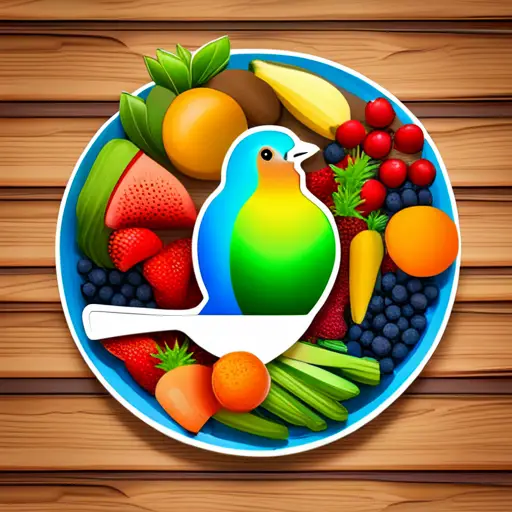
You’ll need to know the basics of bird nutrition if you want to keep your feathered friend healthy and happy, so let’s dive in and explore what your bird needs to thrive!
The digestive system of birds is quite different from other animals, and understanding it is crucial for providing proper nutrition. Birds have a crop, which is a small pouch in the esophagus that stores food temporarily. This allows them to eat quickly and then digest their food at a later time. Birds also have a gizzard, a muscular organ that helps them grind up their food since they don’t have teeth.
In addition to understanding their digestive system, it’s important to know how birds absorb nutrients. Unlike mammals, birds don’t have a true stomach, so they can’t break down food as effectively. Instead, they rely on the acid in their gizzard to break down the food before it’s absorbed into their intestines.
This means that the quality of the food they eat is crucial for their overall health. With this understanding of bird nutrition, let’s move on to choosing the right foods for your pet bird.
Choosing the Right Foods for Your Pet Bird
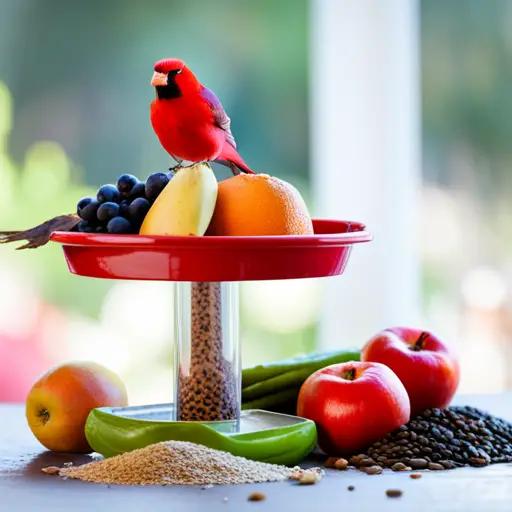
It’s important to pick the appropriate sustenance for your feathered friend to ensure they stay fit and healthy. Here are some things to keep in mind when choosing the right foods for your pet bird:
- Balancing nutrients: Birds need a balanced diet of protein, carbohydrates, and fat to maintain their health. Make sure to choose foods that have a good balance of these nutrients.
- Fresh produce options: Birds love fresh fruits and vegetables, and they’re an excellent source of vitamins and minerals. Offer your pet bird a variety of fresh produce, such as leafy greens, carrots, and berries.
- High-quality pellets: Pellets are an excellent source of balanced nutrition for birds. Look for high-quality pellets that are free of additives, preservatives, and artificial colors.
By choosing the right foods, you can ensure that your pet bird is getting the nutrition they need to thrive. However, there are also certain foods that you should avoid to keep your bird healthy.
Foods to Avoid
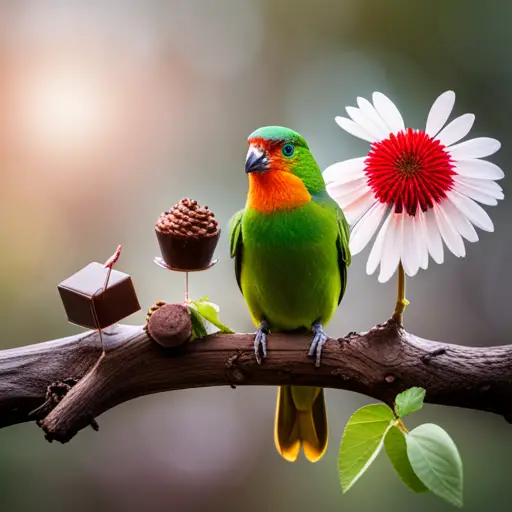
You’ll want to be mindful of certain foods to avoid when choosing what to feed your pet bird. Some foods can actually be toxic to birds, so it’s important to know which ones to steer clear of.
In addition, high-fat and high-sugar foods can lead to health problems, and processed and packaged foods may not provide the nutrients your bird needs for optimal health.
Toxic Foods
Avoid feeding your pet birds foods that are toxic, as these can cause serious health issues. Some common foods to avoid include chocolate, caffeine, avocado, and alcohol. These foods can cause symptoms such as tremors, seizures, vomiting, and even death. If your bird consumes any of these toxic foods, it’s important to seek emergency care immediately.
In addition to the aforementioned foods, there are also certain plants that can be toxic to birds. These include lilies, daffodils, and tulips. If you have these plants in your home or garden, make sure to keep them out of reach of your pet bird.
It’s important to always be aware of what your bird is consuming and to take necessary precautions to prevent any potential harm. Now let’s move on to the next section about high-fat and high-sugar foods.
High-Fat and High-Sugar Foods
Feeding your feathered friend high-fat and high-sugar foods can lead to health problems. While it’s tempting to give your pet bird treats like seeds and nuts, it’s important to remember that a balanced diet is crucial for their overall health.
Balancing macronutrients like fats, proteins, and carbohydrates is essential for keeping your bird healthy and happy. High-fat and high-sugar foods can have a negative impact on bird health, leading to obesity, fatty liver disease, and other issues.
Instead of filling your bird’s diet with these unhealthy options, try offering fresh fruits and vegetables, lean proteins like cooked chicken or eggs, and small amounts of whole grains. By incorporating a variety of foods into your bird’s diet, you’ll ensure that they’re getting all the nutrients they need to thrive.
With a balanced diet, your feathered friend will be able to live a long and healthy life. Speaking of healthy foods, let’s talk about the impact of processed and packaged foods on your bird’s diet.
Processed and Packaged Foods
You may think that processed and packaged foods are convenient for your pet bird’s diet, but you should be cautious. Many of these foods contain preservatives and additives that can be harmful to your pet.
Additionally, food storage can be a concern, as these products may sit on store shelves for months before being purchased. When it comes to processed and packaged foods, freshness is also a concern. These foods may not have the same nutritional value as fresh foods, and the added preservatives and additives can further diminish their nutritional quality.
To ensure your pet bird is getting the best nutrition possible, it’s important to compare the nutritional value of processed and packaged foods to other options. To make sure your pet bird is getting the best possible nutrition, you need to be careful about what you feed them.
Up next, we’ll discuss how to create a balanced diet for your pet bird.
Feeding Your Pet Bird
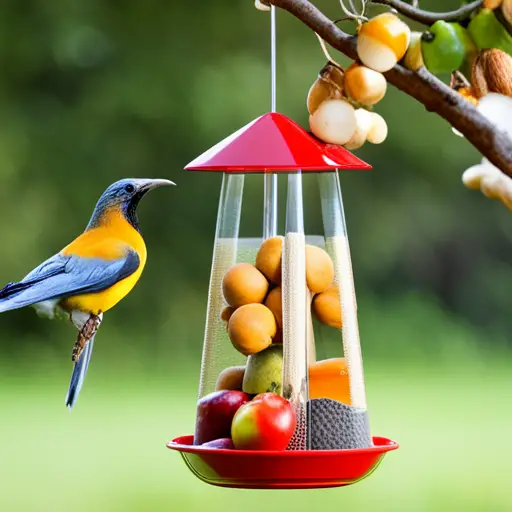
When it comes to your pet bird’s nutrition, it’s important to offer a variety of fresh fruits, vegetables, and grains to keep them healthy and happy. Different bird species have different nutritional needs, and it’s important to research what your specific bird requires. In addition to fresh foods, you can also offer your bird a high-quality pellet or seed mix, but be careful not to rely solely on these processed options.
To help you better understand what foods are best for your bird, here is a table outlining some common fruits, vegetables, and grains for birds, along with their nutritional benefits:
| Food | Nutritional Benefits | Notes |
|---|---|---|
| :————- | :————————————— | :———————————————————————– |
| Apples | Vitamin C, Fiber, Antioxidants | Remove seeds and core before feeding |
| Broccoli | Vitamins A, C, K, Calcium, Fiber | Can be fed raw or lightly steamed |
| Carrots | Vitamins A, C, K, Fiber | Can be fed raw or cooked |
| Millet | Protein, Fiber, B Vitamins | A common seed option for many bird species |
| Quinoa | Protein, Fiber, Iron, Magnesium | Cooked quinoa can be a great source of nutrients for your bird |
| Spinach | Vitamins A, C, K, Iron, Calcium, Fiber | Can be fed raw or lightly steamed |
Remember to always wash fresh foods thoroughly before feeding them to your bird. Now that you have a better understanding of what foods are best for your bird, let’s move on to addressing nutritional issues that may arise.
Addressing Nutritional Issues
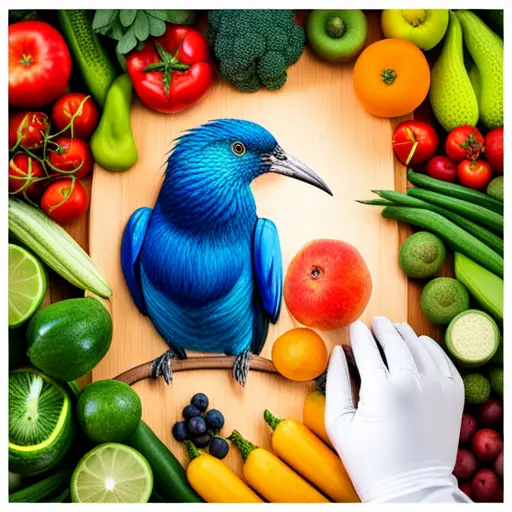
If you’re wondering why your feathered friend is showing signs of fatigue or illness, it might be due to a lack of variety in their diet, causing them to miss out on essential vitamins and minerals. Balancing nutrients is key to ensuring that your pet bird stays healthy and happy.
Just like humans, birds require a balanced diet that provides them with a variety of essential nutrients. It’s important to note that a lack of nutrients in your bird’s diet can lead to serious health implications. For example, a deficiency in vitamin A can cause issues with your bird’s eyesight and respiratory system, while a lack of calcium can lead to brittle bones.
By providing your bird with a balanced diet that includes a variety of fruits, vegetables, grains, and proteins, you can help ensure that they remain healthy and happy for years to come.
Conclusion
Now that you’ve learned about the nutritional needs of your pet bird, it’s time to put that knowledge into action. Remember to always choose a balanced diet that includes a variety of fresh fruits, vegetables, and high-quality pellets.
Avoid feeding your bird foods that are high in sugar, salt, or fat, as these can lead to health problems down the line.
Feeding your pet bird may seem daunting at first, but with a little research and preparation, you can ensure that your feathered friend lives a long and healthy life.
So, are you ready to take on the challenge of providing your pet bird with the best possible nutrition? With the right diet and care, your bird will thrive and bring you joy for years to come.
